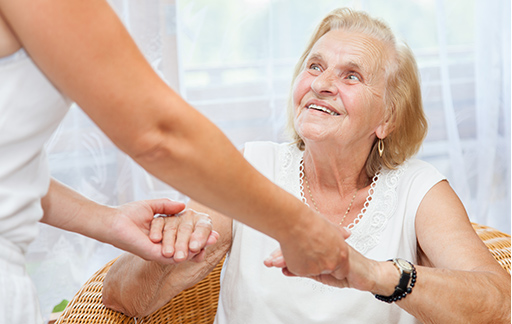
It’s not easy to be a caregiver. It can take a toll on your emotions, finances, and relationships with others. Caregiving for an aging loved one is about more than just doing what they need because of their physical or mental limitations. You have to care for them emotionally and psychologically — which means that you may experience burnout from time-to-time. Some signs of burnout include: lack of sleep, stress, feeling isolated and resentful, and the inability to cope with the situation any longer.
The burnout of caregiving is a topic that needs to be talked about more. There are many struggles involved in the process, and it’s not easy for anyone. You might feel like you don’t have enough support from others, or even yourself at times. Sometimes you’re just tired and need some time off to recharge your batteries before you can return back to caring for your loved one again. One thing’s for sure: caregiving takes its toll on everyone in different ways. But remember…you’re not alone.
Who is considered a caregiver?
A caregiver is someone who provides assistance to others in need, such as a spouse, a disabled child, or an elderly loved one. Many relatives who are actively caring for an aging family member do not consider themselves to be “caregivers.”
What are some signs of caregiver stress?
Caregivers who are under a lot of strain may be more likely to have their own health deteriorate. It’s normal to feel irritated, weary, alone, or depressed. The emotional and physical strain of caregiving is quite common.

Risk factors for caregiver stress include:
• Financial problems
• Isolation from others
• Caregiver options are limited
• High number of hours spent caregiving
• Living with the person you are caring for
Signs of caregiver stress
You may be so consumed with caring for your loved one that you don’t realize how your own health and well-being are suffering.
Be on the lookout for these signs of caregiver stress:

• Feeling sad
• Gaining/losing weight
• Often feeling fatigued
• Getting too much sleep/not enough sleep
• Feeling constantly worried or overwhelmed
• Becoming easily agitated, irritated, or angry
• Losing interest in activities you used to enjoy
• Having frequent physical problems (headaches, bodily pain, etc)
Stress is harmful to one’s health if it happens for an extended period of time. You’re more prone to depression and anxiety as a caregiver. Furthermore, you may not get enough sleep or physical exercise, both of which increase your risk of medical issues like diabetes and heart disease.
What are some strategies for dealing with caregiver burnout?
Being a caregiver can be stressful for anyone. It’s important not to feel guilty, and to know that it’s perfectly normal for you to go through these feelings. If your loved one requires 24/7 care, the feeling of burnout is almost inevitable. That is why utilizing all of the resources and tools available to assist you in caring for your loved one is so crucial.
Here are some ways to manage caregiver burnout:
• Make sure you take time for yourself every day to do the things that make you happy. This could include going out with friends, reading a book, playing sports etc. Getting your mind off of your loved one and putting it on something else is beneficial for everyone involved.
• Make sure to get enough sleep at night so that you can function properly on a daily basis. Being sleep deprived is extremely dangerous both for you and your loved one – it can lead to accidents, health problems etc.
 It can take a toll on your emotions, finances, and relationships with others. Caregiving for an aging loved one is about more than just doing what they need because of their physical or mental limitations. You have to care for them emotionally and psychologically — which means that you may experience burnout from time-to-time.
It can take a toll on your emotions, finances, and relationships with others. Caregiving for an aging loved one is about more than just doing what they need because of their physical or mental limitations. You have to care for them emotionally and psychologically — which means that you may experience burnout from time-to-time.
• Accept help from family members, friends, or even professionals. It is so much easier to manage burnout when you have a support system behind you and helping out as needed.
• Take regular breaks from caring for your loved one if possible, such as going on vacation or even just spending the day at home alone doing whatever it is that makes you happy. This will help recharge your batteries after being so focused on your loved one.
• Join a support group, which can offer encouragement, validation, and strategies.
• Maintain a healthy lifestyle by exercising and eating right. This will help reduce stress levels as you go through the different stages of burnout.
• Respite care can be one of the most effective ways to manage burnout. Many communities have some type of respite care available. This means that someone else will step in for you, either on a temporary or long-term basis, to allow you the time away from your loved one that is necessary to recuperate and recharge.
If possible, try not to feel guilty about taking care of yourself first! The more out of balance your life becomes because of burnout, the harder it will be to return to your normal routines and ways of coping. It may be difficult to ask for help, but remember you are not alone. Many others have experienced the same feelings and found ways to cope.
If you are a caregiver, don’t be afraid to seek help from local resources and services in your community.

 It can take a toll on your emotions, finances, and relationships with others. Caregiving for an aging loved one is about more than just doing what they need because of their physical or mental limitations. You have to care for them emotionally and psychologically — which means that you may experience burnout from time-to-time.
It can take a toll on your emotions, finances, and relationships with others. Caregiving for an aging loved one is about more than just doing what they need because of their physical or mental limitations. You have to care for them emotionally and psychologically — which means that you may experience burnout from time-to-time.